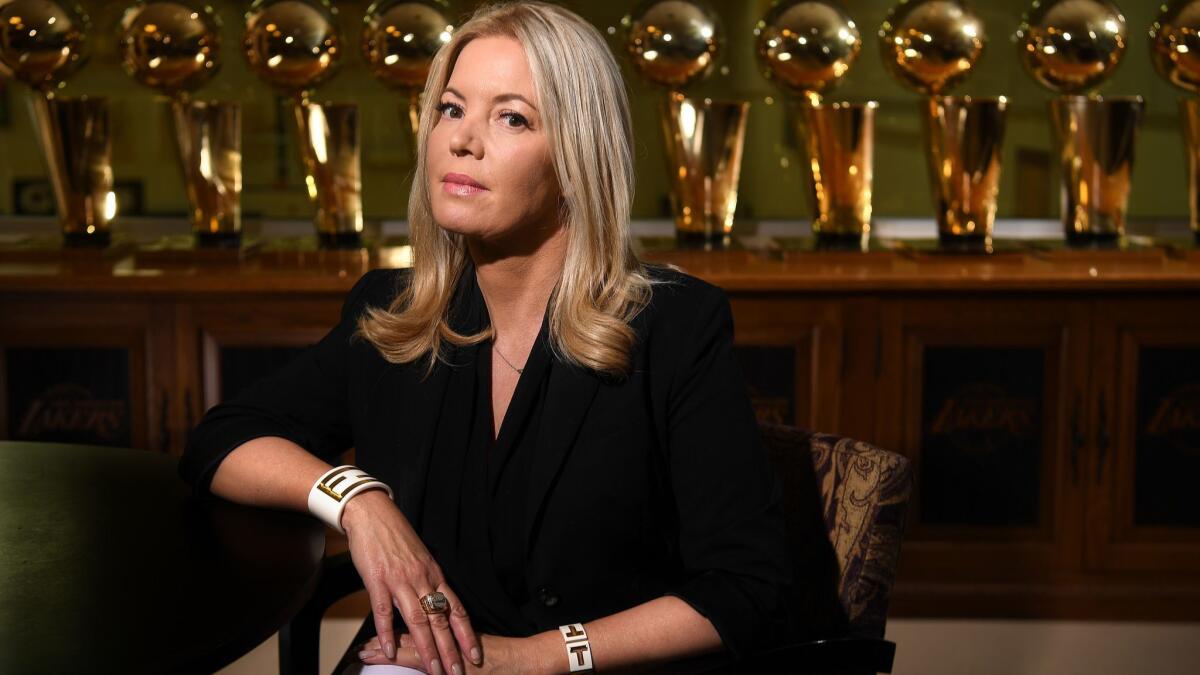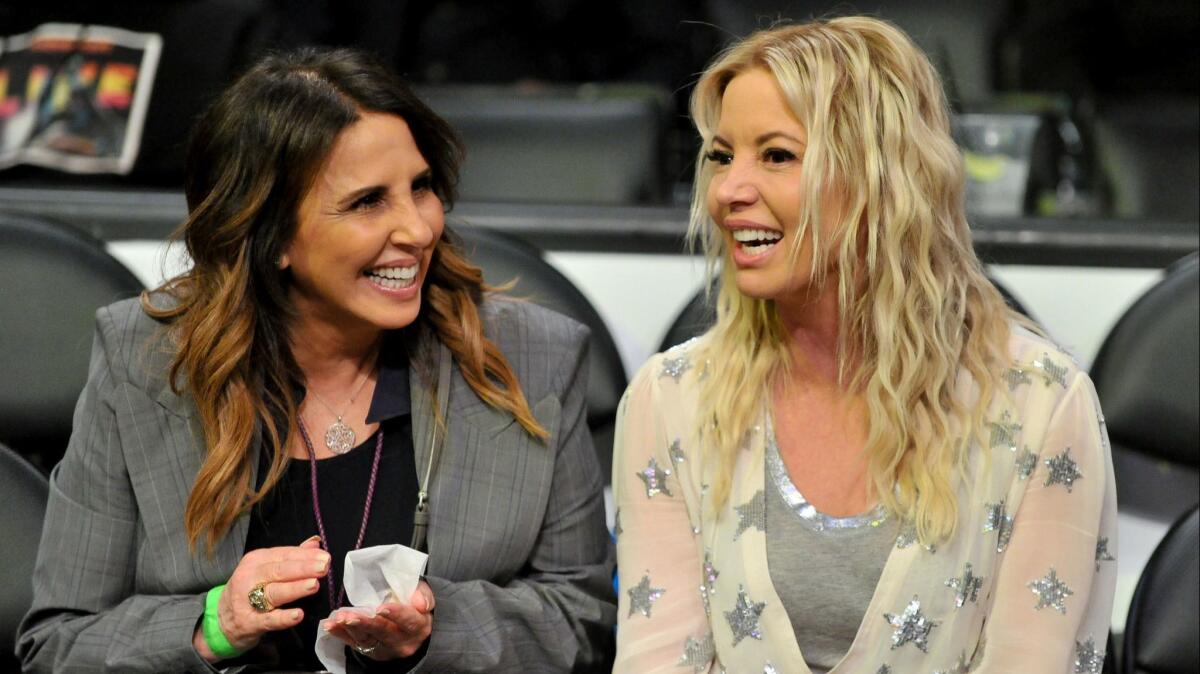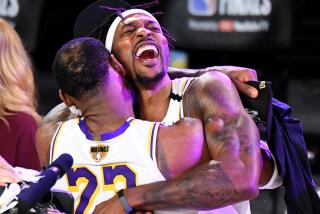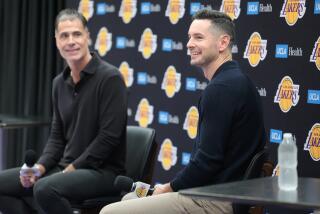Who’s making the decisions for the Lakers? It’s complicated

- Share via
The Lakers called a news conference Monday to introduce their new coach. But what Frank Vogel had to say was minimized hours before he ever uttered a word.
Magic Johnson eviscerated Lakers general manager Rob Pelinka in particular, and the Lakers’ power structure in general, in comments he made on the ESPN show “First Take” and again in an interview with The Times in the hours leading up to the media event.
Johnson cited “backstabbing and whispering” among the reasons he resigned as the Lakers’ president of basketball operations last month. Monday morning, he identified Pelinka as “who I was talking about when I said backstabber.”
The Lakers icon, a perennial All-Star in his playing days, also criticized Jeanie Buss, the team’s controlling owner, saying she was allowing too many people to influence her decision making.
“If the Lakers are going to be successful from here on out — and this is really crucial — first, Jeanie can’t be emotionally tied to anybody,” Johnson told The Times. “You can always appreciate them and like them, but you can’t let that get in the way of firing someone or trade a player.”
The final straw, Johnson said, was what happened when he made it known he wanted to fire Luke Walton as coach. He said Buss agreed at first, but then involved Tim Harris, the Lakers’ president of business operations. Harris argued to keep Walton.
“I only really answer to Jeanie Buss and now I have Tim involved,” Johnson said. “It’s time for me to go.”
Johnson said he had also learned Pelinka was badmouthing him about not working from the office, when they actually had a prearranged agreement that Johnson wouldn’t always come in.
Neither Buss nor Harris spoke at the news conference, which was held at the team’s headquarters in El Segundo. Pelinka appeared with Vogel, answering questions about the hiring process, his new role as the Lakers’ top basketball executive, and about Johnson’s comments. It was the first time since Johnson’s resignation on April 9 that any member of the Lakers’ front office publicly addressed the team’s hierarchy.
“These things are surprising to hear and disheartening, but I look forward to the opportunity to talk with him and sit down with him and work through them just like in any relationship,” Pelinka said of Johnson’s comments. “They’re just simply not true.”
Like Johnson, Pelinka — Kobe Bryant’s one-time agent — had never worked in an NBA front office before the Lakers hired him. He was paired with Johnson on Bryant’s recommendation.
Johnson said he had no issue with Pelinka being heavily involved in the Lakers’ basketball decisions, but that “everybody else around the organization has got to stay out of the way.”
He specifically mentioned Harris, younger Buss siblings Jesse and Joey, team executive Linda Rambis and her husband, Kurt, an adviser.
“That’s what’s hurting the Lakers,” Johnson said to The Times. “… Tim Harris, you got to run the business. I’m sorry, but you can think you know basketball, but you really don’t. … Jesse, continue to be assistant general manager and a scout. … Joey, run the G-League, the South Bay Lakers [a developmental affiliate]. … So whatever role Kurt has, that’s his role. Whatever role Linda has, that’s her role.
“Define roles and everybody got to stay in that lane. … You can’t make good decisions because you got six, eight voices and everybody thinks their strategy is the right one. You can’t have that.”
The Lakers are, at root, a family business. Jerry Buss purchased the team in 1979 and was its face until his death in February 2013.
He left daughter Jeanie in charge, and she has relied on the advice of a coterie of trusted colleagues in affirming control. Officials from the Lakers and other NBA teams, as well as player agents described to The Times how Buss’ inner circle was formed.
Four years after Buss took over leadership of the Lakers, she was the target of a takeover attempt by her older brothers, Johnny and Jim. After surviving that battle, she hired Johnson as the club’s basketball boss in the spring of 2017 because she trusted him and regarded him as family. But she has also relied on other longtime associates.
She met her best friend, Linda Rambis, some 40 years ago, when Linda’s last name was Zafrani.

Linda Zafrani’s sister, Debbie, was a Playboy Playmate and Jerry Buss’ girlfriend in the late 1970s, according to the Jeff Pearlman book “Showtime.”
When Buss bought the Lakers and their home arena, the Forum, he hired Linda Rambis as part of the sales team. Later, when Jerry Buss tasked Jeanie with running the Los Angeles Strings of the World Team Tennis league, Rambis went with her. At the time, Buss was 19, Rambis seven years older.
In her book “Laker Girl,” Buss described Rambis as like a sister. Rambis ran the Strings’ day-to-day operations while Buss focused on finishing school at USC. Jerry Buss saw Rambis as someone who could mentor Jeanie. Before long, the two women became close.
Kurt Rambis signed with the Lakers as a free agent in 1981, the start of his NBA career. While winning four championships with the Lakers, he also caught the eye of Linda Zafrani. They were married in 1985.
No matter where Kurt’s career took him, Linda stayed with the Lakers. Her title with the team is manager of special projects, but in many ways she is Buss’ right hand. When Kurt Rambis was hired by Minnesota, the women further bonded over both being in relationships with NBA head coaches — Buss dated Phil Jackson, Lakers coach from 1999-2004, for 17 years.
The women sit next to each other at every Lakers home game. Sometimes Rambis surprises Buss by arranging for her favorite actors or musicians to visit.
Recently, Rambis’ influence has entered the basketball realm, mostly because Buss has taken a more hands-on approach. In 2017, when a businessman contacted the Lakers about potentially moving back to the Forum, Rambis joined Buss in the exchange of emails. When LeBron James talked about the Lakers’ leaders, he always mentioned Rambis. James’ agent, Rich Paul, could often be seen chatting with Rambis — either in their seats or in the back hallways of Staples Center.
Last summer, the Lakers found a way to bring Kurt Rambis back to the team — as an adviser. On Monday, Pelinka lauded him as “a valuable resource throughout the process with his championship experiences of being on many staffs and winning for the Lakers and with other organizations.”
Kurt Rambis traveled with the team on the trip that coincided with the trade deadline. He sat in on meetings with the Lakers’ scouting department. After the season, he became integral to the Lakers’ coaching search. He was part of the Lakers’ prospect interviews during the NBA draft combine last week.
Pelinka ran the coaching search at first, meeting alone with Tyronn Lue and Monty Williams. Kurt Rambis then joined Pelinka to meet with Jason Kidd on April 22. The rest of the team’s interviews were conducted by the seven person group of Jeanie, Jesse and Joey Buss; Linda and Kurt Rambis; Harris and Pelinka.
It was too much, in Johnson’s opinion.
“That’s why when I first came in everybody was mad at me, because I stopped that,” he said.
When they were first paired, Johnson and Pelinka handled the Lakers’ personnel decisions, often spending hours on the phone together. But Johnson became wary of others trying to exert influence on the team’s basketball business — specifically Harris and Jesse and Joey Buss.
Johnson said Monday he had to “monitor” the youngest Buss brothers because of their aspirations to run the Lakers’ basketball operations. Both men are also part owners of the team.
Their introduction to the Lakers was different from their siblings, who are all at least 20 years older. They grew up in San Diego with their mother while their father commuted to Los Angeles. Jerry Buss taught them about the family business. They took more of an interest in the basketball side of things than did some of their older siblings.
Jesse Buss, 31, has been scouting for the team since he was 19. His father taught him the Lakers’ business, sometimes giving him projects. One time, Jesse asked his father if he’d ever want a defensive-minded team. Buss asked his son to research how many championship teams had a past or future MVP on them. It was his way to illustrate the importance of having a superstar to build around.
Jesse’s scouting has a significant impact on the Lakers’ draft, which has provided players who have turned into valuable pieces for the Lakers over the years — either in trades or on the court. D’Angelo Russell, Larry Nance Jr. and Jordan Clarkson all became part of trades that helped the Lakers clear the salary cap space to sign James. Russell became an All-Star in Brooklyn.
Joey Buss, 34, was a coaching associate for the Lakers in his early 20s while Jackson was coach and Kurt Rambis was an assistant. He then spent time learning the business side of the Lakers’ operation and used what he learned there in running the South Bay Lakers.
For nearly all of the siblings’ professional lives, Harris has been a major part of Lakers’ business. He began working for Jerry Buss in 1990.
He is president of business operations and helped orchestrate the deal with Spectrum SportsNet to televise the Lakers — one of the most lucrative regional television deals in sports. Harris is now the alternate to Jeanie Buss as governor for the Lakers, which means he can represent the organization in board of governors meetings with the league.
Harris has long been included in the Lakers’ pitches to top free agents, just in case someone had questions about the team’s business side.
The team’s biggest current investment, James, attended the news conference dressed head to toe in black and neon colors of Nike gear. James has said he was disappointed that Johnson walked out on the Lakers, but he offered no comment on Monday. Not about Johnson’s opinions nor Pelinka’s explanations.
James didn’t even have a comment about Vogel, his new coach, the man the Lakers were trying to spotlight.
Follow Tania Ganguli on Twitter @taniaganguli
More to Read
All things Lakers, all the time.
Get all the Lakers news you need in Dan Woike's weekly newsletter.
You may occasionally receive promotional content from the Los Angeles Times.








